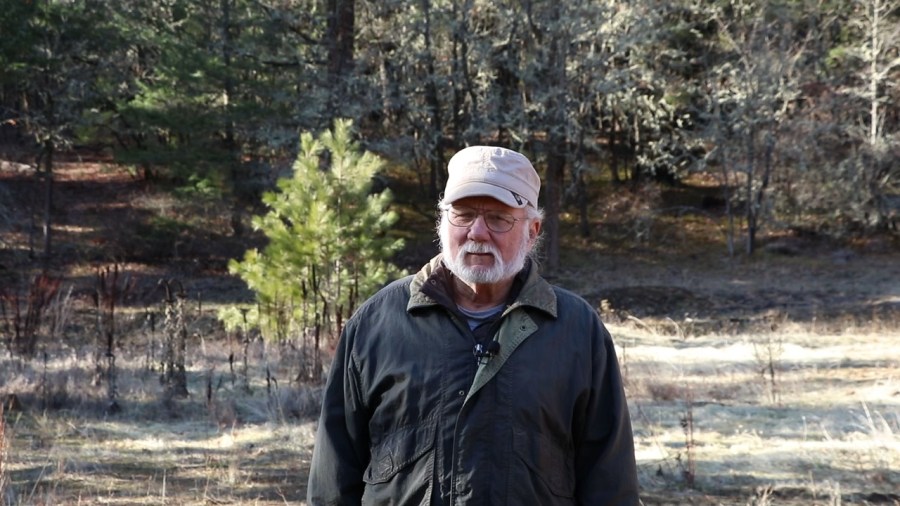KLICKITAT COUNTY, Wash. (KOIN) — Karen and Don Franks met later in life than most couples, but fell in love so deeply that the thought of being parted — even by death — was unbearable. They found a unique way to stay connected though: being buried literally shoulder-to-shoulder in a natural burial cemetery.
“To us that just seemed very comforting and romantic and just the way that we wanted to be laid to rest,” Karen said. “That we would be side by side even if we weren’t there starting at the same time.”
Last January, Don got sick with what Karen now says she believes was COVID. He had numerous underlying health conditions and was sick for several weeks, then seemed to get better before falling ill again. He passed away two months later, at the age of 72, with Karen by his side.
They had been together for 10 years, after meeting on a MAX train when they were both on their way to see President Barack Obama speak at the Oregon Convention Center. They talked nonstop as they waited in line and were together ever since. Both loved science and technology — Don was trained as a biologist — so when they heard a speech at Back Fence PDX about green cemeteries, a lightbulb went off for both of them, Karen said.

In 2018 they found Herland Forest, a natural burial cemetery north of the Columbia River Gorge. It doesn’t look much like a cemetery. There are no tombstones or mausoleums, and nature dictates the arrangement of graves.
“People here are buried among the trees,” senior steward Walt Patrick said, “in places where the trees have decided is a good place.”
In order to minimize the environmental impact, bodies laid to rest at Herland aren’t embalmed or placed in coffins. They’re simply wrapped in a shroud or a wicker basket before burial.
The cemetery is an extension of Windward Education and Research Center, a cooperative community that researches how to feed, fuel and clothe people on marginal land, Patrick said. He and the other members grew to cherish their land and many of them want to be buried on it. In Washington, though, you can only bury a body in a licensed cemetery.
So they made it a cemetery, which carries the added benefit of giving the land even stronger protections from development.
“Twenty years down the road, if someone wanted to clear-cut this forest … because there are bodies buried here, developing this land would not be development, it would be desecration,” Patrick said.

That’s why the people who have committed to being buried at Herland Forest are known as “guardians,” he said. They’ve given their remains to guard the forest and keep it from being developed.
Karen sees it as a “kindler, gentler way to look at your final resting place.”
“To become part of the environment and the ecology around you and to give back to the earth,” she said.
She and Don were the ones who came up with the idea for the “lovers’ grave,” specifically asking Patrick if there was a way to bury them even closer together than normal.
“I was amazed at what they came up with,” Karen said.
When a couple picks their spot in the forest, stewards dig the grave by hand, place a plywood barrier in the middle, and fill both sides with woodchips. Then they can easily remove the chips and inter a body when one person dies, regardless of whether the ground is rock hard in the heat of the summer or frozen in winter.
The idea has caught on.
Herland Forest has had around 50 burials during the past five years. Its popularity is spreading, especially among couples, which was originally surprising to Patrick. Now, it makes perfect sense.
“When you have a relationship that goes back for decades, people don’t want that to stop just because the heart stopped,” he said. “The metaphorical heart doesn’t stop at that point.”
Patrick encourages future “guardians” to come enjoy the property while they’re still alive, escaping the distractions and “crazy sounds of the city” and instead savor the memories.
Karen and Don drove to Herland from Gresham multiple times over the past couple of years, and got to see their freshly-dug graves one summer. Picnic tables and benches are placed around the forest, inviting loved ones to stay a while. Some have even camped next to the graves, or at the more traditional campsite just down the road.


Patrick is always looking to give people even more choice when it comes to the afterlife. Since parts of Herland Forest are flush with large rocks, he’s considering the possibility of burial cairns. They also started natural organic reduction — more commonly known as human composting — in December.
“I find that for people who are trying to deal with the sense of loss that comes with death of a loved one, whatever degree of control and participation you can take, it’s like fighting back. Yes, death is coming in, but we’re gonna do it our way.”
While Karen still gets teary-eyed thinking about losing Don, she said they both found comfort with their plan to be together, forever.
She’s not in a rush to join him in the forest, but is grateful to know they’ll be reunited again.
“Who wouldn’t want to become part of a forest?” she asked. “And to be snuggled up next to your best friend and your love right next to you.”